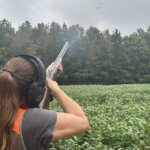“Dead bird! Dead bird!” Ah, so satisfying hearing the ref call those words. Anne had to work to control her excitement as she inched her way around the skeet field. She was a little nervous about the second half of her day though when she would rotate to the trap field. Some of her squad-mates told her that she shouldn’t expect to fair as well in trap unless she had a dedicated trap gun.
“It’s hard enough for a shooter to be able to shoot all three disciplines at any real level competitively, much less with the same gun. You just can’t do it,” remarked Jason, one of the more senior shooters on her squad. Anne loved her old Remington. Her dad gifted it to her, so it held a lot of meaning. He even took her to have it professionally fitted. Unfortunately, Anne knew in her heart of hearts that Jason was right. She consistently struggled in trap. Her gun shot flat, a true 50/50. There were plenty of times she was a little shocked when the referee called “dead” as the bird often managed to get quite a ways out into the field before she could put the shot together. The other trap shooters, with their dedicated trap guns could crush it right out of the trap house!
“You Don’t Use a Hammer When You Need a Screwdriver.”
Have you heard that expression before? I certainly have. Whenever I would tag along on projects with my grandfather, an engineer by trade, he impressed upon my brothers and me that you have to make sure you use the right tool for the job – or, you’ll struggle, possibly fail.
In the world of clay games, there are three categories, although Helice is gaining in popularity, so might as well say four. Trap, skeet and sporting clays are very different from each other, but they all involve the shooter trying to build consistency in crushing a clay target. This month, we dive deep into whether a shooter can or even should shoot all the clay games with just a single shotgun option.
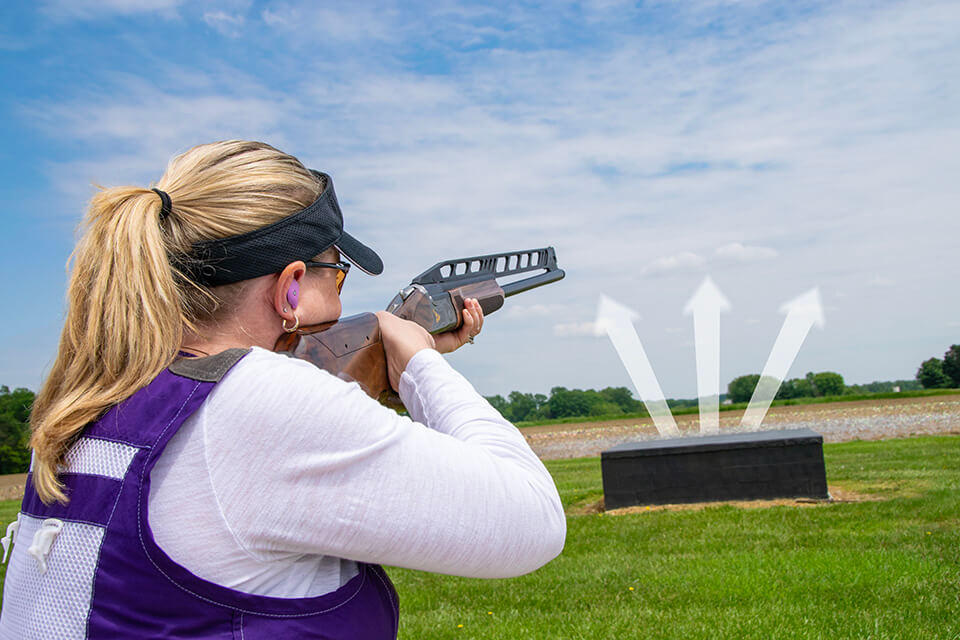
Trap uses tiles or pads starting at 16 yards, going back to 27 yards and all are located behind a centralized trap house. That trap house is sunken into the ground and every presentation is up, up and away and varies in degree of windage from left to right. Each player will shoot 25 birds, one at a time and 5 shots per tile before rotating to the tile on their right.
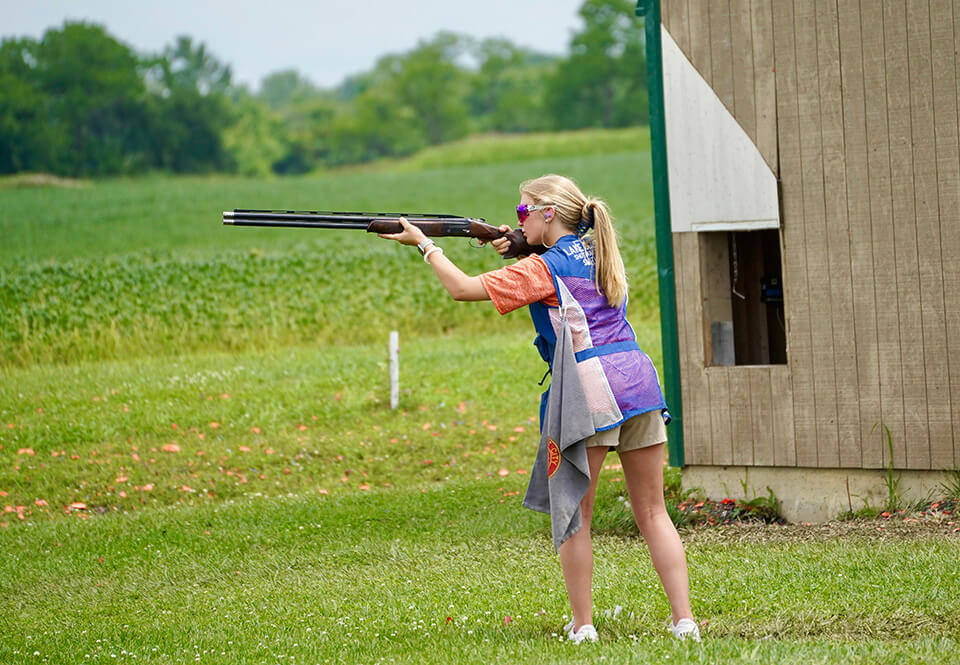
Skeet has a half-moon tile layout – with a high house on the left and a low house on the right and the presentations never change, unless it’s windy and then it gets really fun! A shooter will follow a menu from each tile and the complexity changes with each rotation. Most shooters lament the dreaded #4 tile and the #8 tile, located in the middle of the half-moon.
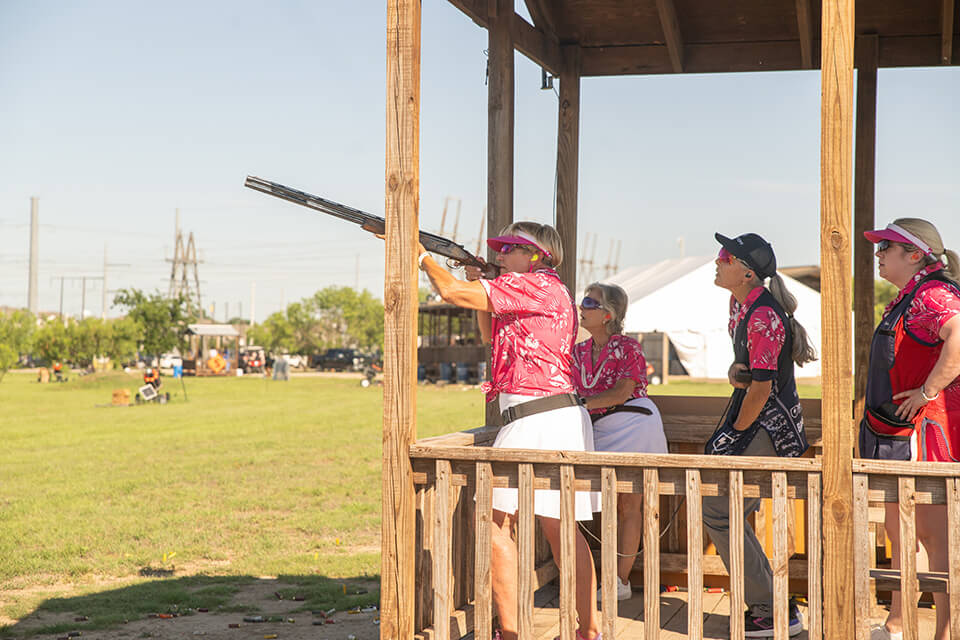
Sporting clays is touted as golf with a gun. A shooter will move throughout a course that is laid out over 14 to 16 stations and shoot a total of 100 targets. These targets will include a wide array of presentations, including quartering (trap), crossing (skeet), chandelles, rabbits and more. There is literally no limit, other than the constraints of the trap setter’s imagination to the types or numbers of presentations you may see in sporting clays.
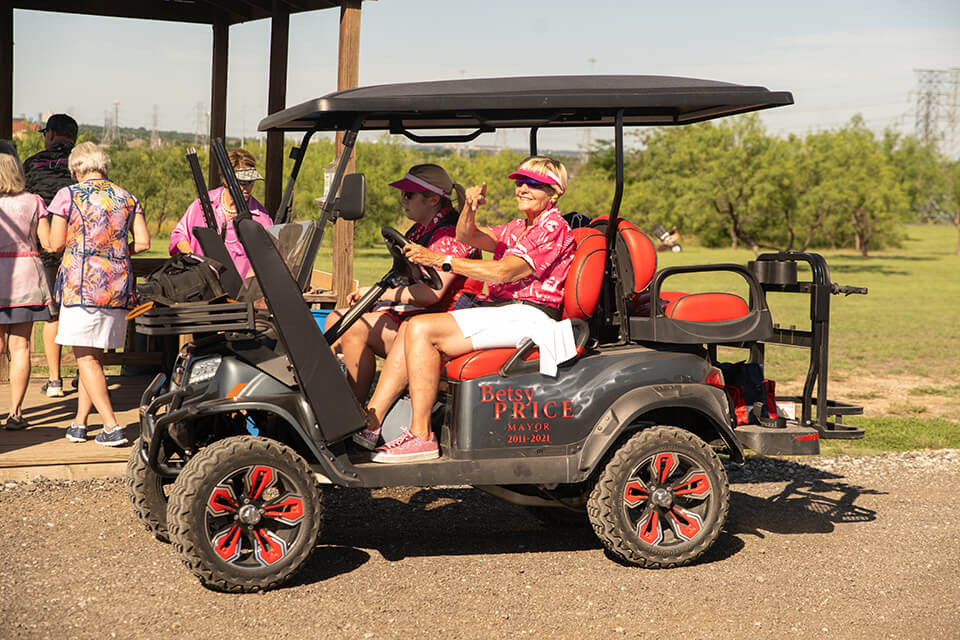
If all these games use a clay pigeon zipping along through the air, then why can’t you use one gun to shoot them all? Technically, you can! Will you beat everyone all the time? That’s a bit of a rigged question, as it depends on your abilities PLUS your gun. The blanket answer is a resounding NO (sort of, keep reading). Sorry. There is a ton of physics and geometry embedded with each of the games and to be a serious competitor, you must always try to set yourself up with the advantage.
Everyone Loves Ribs!
Clarification – everyone loves shotgun ribs, not the juicy, tasty kind everyone is cooking up on their grills this summer. Designers realized a few decades ago that a hot barrel creates distortion waves. Those waves make it pretty tough to attain a clean sight picture and so they started crafting the rib to sit atop the barrel. The rib assists in venting the hot barrel and dissipating the waves. The rib is also what sets the POI (point of impact) and determines if you are shooting where you are looking. When it comes to sporting clays and skeet, the POI is typically 50/50 since there are both quartering and crossing birds. But, in the game of trap, your birds are all quartering and best taken on the rise before they get more complicated farther out in the field and begin to fall or become susceptible to such variables as the wind, unpredictable at best.
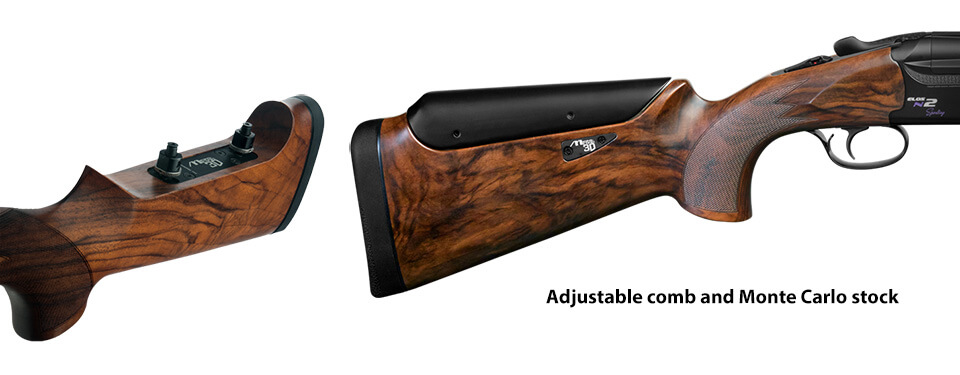
I’ll refrain from the rabbit hole of gun fit, but do want to strongly impress upon you that you need to have a solid gun mount with a gun that fits you. There are several factors that go into gun fit and LOP (length of pull) and where your eye sits on the rib are the most paramount. Syren shotguns are built specifically for a woman’s anatomy, and they offer shorter LOPs, making it easier to get into the gun correctly as well as a Monte Carlo stock offering a more comfortable mount to the comb. Women have higher cheekbones and an ill-fitting gun with too much drop at the comb will force a shooter to crane her neck to try and properly align the eye on the rib.
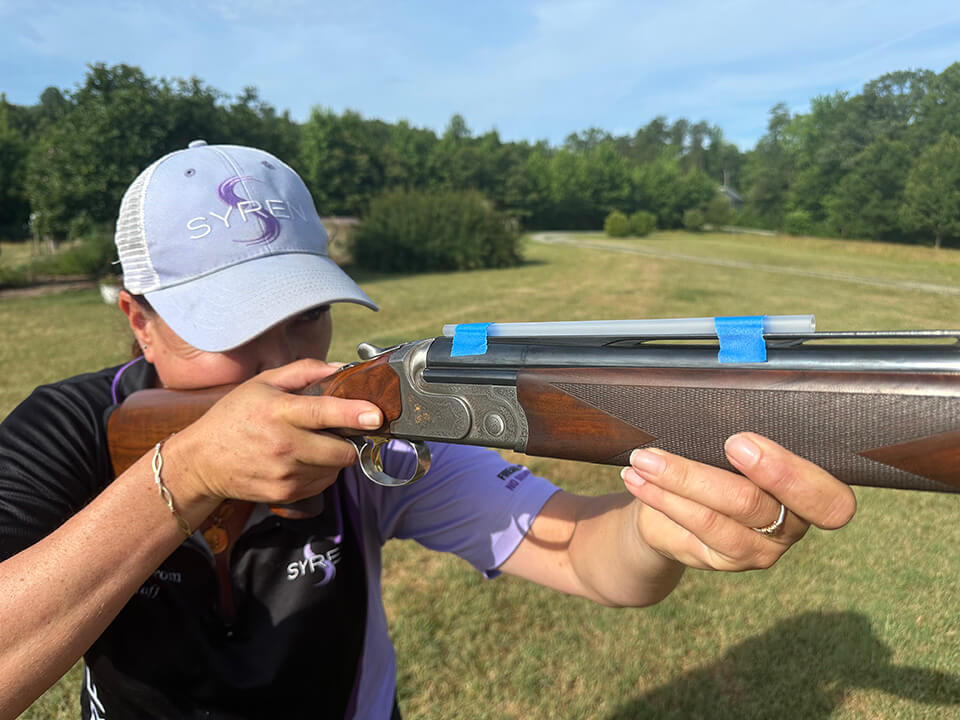
Have you had your gun professionally fitted? Have you at least taken a moment to see if your gun fit is comfortable and correct for you? If you do not have a solid gun mount, the gun fit will keep moving around and when dealing with a moving target, more movement behind the barrel is NOT in your favor. Here’s a handy and rather clever gun fit hack I found from Roger Pace on YouTube. Take a regular drinking straw and tape it to the top of your rib using painter’s tape. When you mount your gun, you should be able to look straight through the straw to the bead. If you find yourself having to twist the gun or turn your head at different angles, then you are not correctly aligned down the rib and it’s costing you clays.
There are, of course, various types of ribs for shotguns. We’ve all seen the super high trap ribs. These raised ribs allow a shooter to maintain a more upright head profile. Since the barrel is well below the rib, the shooter can acquire the target faster, which is how your buddies on the trap field are shooting their clays so quickly. They can just flat-out see the target before you because the gun barrel is no longer in the way.
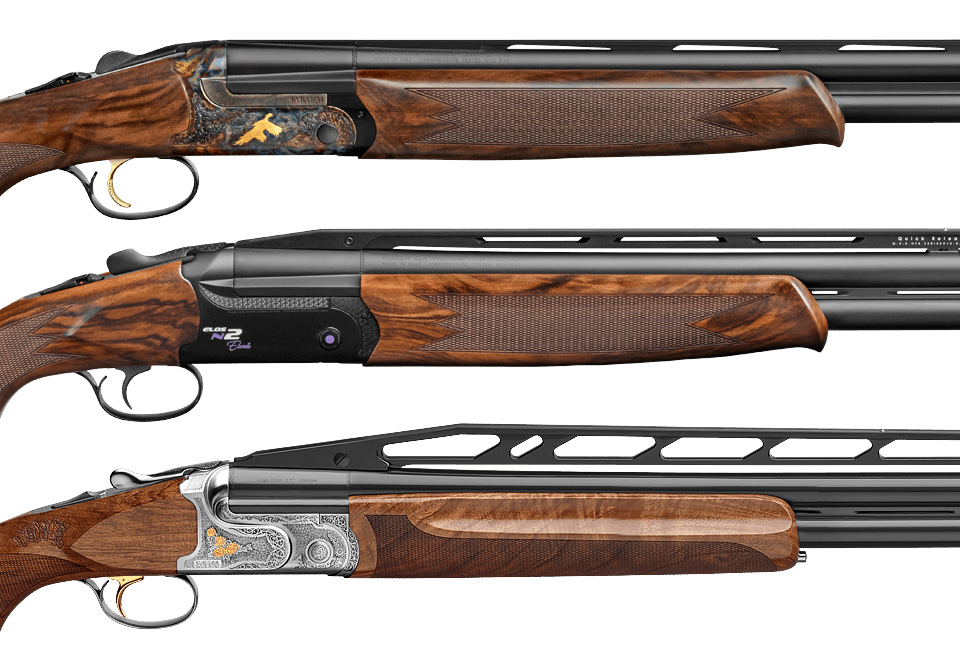
Mid-ribs are becoming increasingly more popular on guns that are used for multiple disciplines. The mid-ribs aren’t as tall as the extreme trap ribs, but still offer a significant elevation allowing that faster visual capture of the target. It’s this mid-rib that is part of our Quick-Release Rib system on the Elevate models. The presentations on a sporting clays course vary greatly and a large portion are “trap-style” shots. The mid-rib is gaining significant popularity for sporting clays and for shooters that love participating in multiple disciplines.
Finally, the flat rib is the most common, especially on American guns. The rib extends from the receiver in a relatively straight line promoting a high-gun hold. Most field/hunting guns will have a flat rib. This design can leave a longer-necked shooter straining to get their face flat against the comb, causing the shooter to miss high. If you have a shorter neck, a flat rib will certainly feel and fit better although it will handicap you against your high-rib shooters on a trap field.
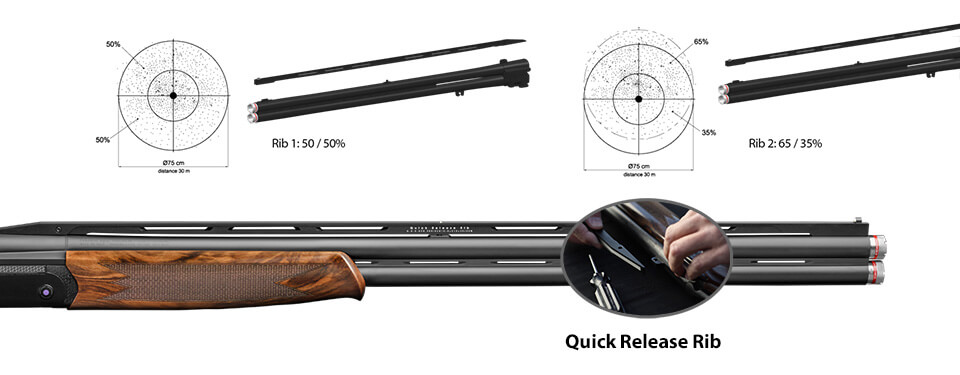
Does “One and Done” Truly Exist?
“How many shoes does your wife own?”
“It’s unAmerican to own just one gun!”
“You aren’t a serious competitor if you don’t have a separate gun for each game.”
And my favorite, “No one shoots all three disciplines at a serious competition level.” Well, someone has obviously never heard of Kim Rhode or Derrick Mein, just to name two right off the top of my head. What about the 4H and SCTP kids that regularly compete in all three disciplines and can put most shooters to shame? As for the other comments, they’re just ridiculous. So, can you and should you try shooting all types of clay games with just one gun?
ABSOLUTELY!
Despite the ridiculous plethora of silly and unfortunately, often sexist comments you’ll find on the forums, you CAN shoot all the games with a single shotgun. No need to sell a kidney or re-mortgage the house to afford all your favorite clay sports. Syren not only understands what a woman needs in a great shotgun, but also, they understand what women want their guns to do for them. It’s not feasible to expect everyone to go out and purchase a gun for each game. Quite often, just purchasing that one gun is a stretch. How does Syren work this magic then if so many say it can’t be done?

Incredible engineering, that’s how. The Syren Elos N2 Elevate is an engineering marvel. Coming in at 7 pounds, 10 ounces, it can be customized at the POI, stock, trigger, recoil characteristics and overall weight and balance. A more upright shooting stance decreases felt recoil, making the gun more comfortable and reduces strain on the neck allowing the shooter to concentrate totally on the task at hand, crushing clays. Most importantly, a Quick Release Rib system allows the shooter to swap ribs to compete in multiple disciplines. One rib places the POI at 50/50 and the other at 65/35. Or, swap barrels on the trap combo for the Unsingle and the POI is at 70/30.

Prefer an autoloader? Syren will be releasing the all new L4S Elevate soon! The set-up mirrors that of the Elos N2 Elevate with an adjustable comb, Quick Release Rib system, as well as all the other standard features, but packed into just 7 pounds, 7 ounces. The gas operating system is calibrated to target loads. That means you can shoot lower recoil shells without fearing a malfunction or the dreaded jam. A softer shooting, lighter gun translates to more practice!
Whether you love trap, skeet, or sporting clays or can’t bear to choose a favorite, Syren makes it oh-so-easy to excel at all three. Just think of how much ammo you can buy with all the money you saved buying a single, phenomenal gun instead two or three different guns!
Find a Syren shotgun for your lifestyle.
Enjoying this post? Read more just like it on our Syren Savvy Blog HERE.
*This article was originally posted in our column on WomensOutdoorNews.com written by Kate Ahnstrom and edited by WON Publisher/Editor Barbara Baird.





